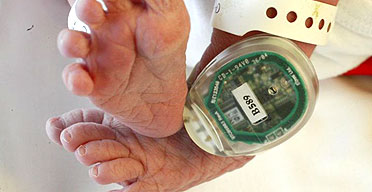
New-born babies are having electronic tags applied to their ankles in the first hour of life to prevent them being snatched from maternity wards.
Last week Medway NHS trust became one of the first to install the new system. Dot Smith, the midwifery manager, said the aim was to tighten security.
Under the scheme, immediately after birth a personalised electronically-programmed tag is attached to the baby's ankle. Each baby's position in the ward can then be monitored on a central control panel.
If anyone attempts to take the baby outside the authorised maternity area, sirens sound and doors are sealed, preventing any escape. The same happens if anyone tampers with the tag.
The introduction of baby tagging in the NHS follows the widespread use of the technology for released prisoners and failed asylum-seekers regarded at risk of absconding.
Mrs Smith said the system was designed to reassure mothers that their babies would be safe at all times. Maternity wards were accustomed to keeping out strangers, but there was always the possibility that a father or other member of the family might try to run off with the baby during a domestic dispute.
"We never had an abduction from Medway, but we thought it was better not to wait until we did before installing the best security," Mrs Smith said. "We chose this one because the tags are easily cleaned and the bands attaching them to the baby's ankle are disposable. So there is very little risk of contamination of cross-infection.
"Everyone that I've spoken to was really impressed. My worry was that we would find some mothers who thought it was peculiar to have electronic equipment fitted on their babies. But we presented it as routine. They all agreed and we have had no negative feedback."
The Medway maternity unit has 10 birthing rooms and beds for 42 mothers and their new-born babies. It has been supplied with 90 sets of electronic tags, providing enough spares to keep the equipment fully recharged.
The £27,500 scheme was recommended by a quality audit at the hospital, but could not get the go-ahead until the hospital's League of Friends offered a £20,000 donation.
Sharon Boardman, whose baby Katie was born on Monday, said she was surprised, but pleased, when the midwife told her that the infant would be tagged.
"Shops have tags with blue dye to stop people walking out without paying for the goods. It's nice to know that nobody can come in and take your baby out without the security going off," she said.
"She has my name on a tag on one leg and her name and the electronic tag on the other. You don't really notice it. You can change their nappy just the same."
The system was supplied by Visonic Technologies in Bedford. Its chief operating officer, Tony Mann, said: "There are about 10 baby abductions in Britain each year. There are occasions when the mother is sleeping, or leaves her baby while she bathes or eats, and it is at these times when the baby is vulnerable.
"Another increasing concern in maternity units is the possibility that a mother could mistakenly breastfeed the wrong baby - causing possible transfer of HIV or other infections if the mother or baby were already infected."
The system installed at Medway prevented that by providing each mother with an electronically paired wrist tag. "She just needs to press it to activate a test match to be certain she has her own baby," he added.
The Department of Health said its guidelines for security in maternity wards were last updated about eight years ago. They recommended tight restrictions on access for 24 hours a day, using electronic passes, an intercom system and CCTV cameras, but offered no guidance on tagging.
The government introduced guidelines on security in maternity units in 1995 after a series of high-profile cases when babies were snatched from wards. Measures such as introducing CCTV cameras and tagging babies were suggested but are not compulsory.
One of the most well known cases was when baby Abbie Humphries was taken from Queen's Medical Centre, Nottingham, in 1994 just four hours after being born. She was found 15 days later just a mile away at the home of Julie Kelley, a 22-year-old woman with a severe personality disorder.

